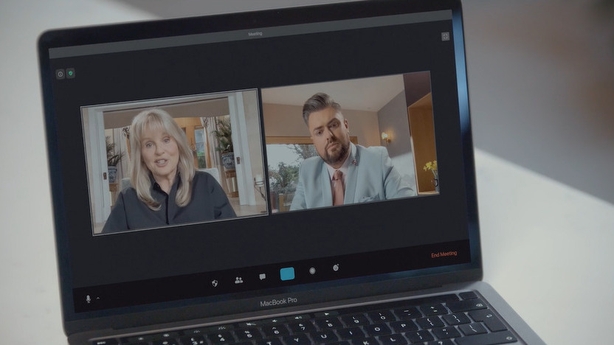As part of Bank of Ireland's 'Money Smarts' series, presenter James Patrice spoke to cyberpsychology expert Professor Mary Aiken.
As a cyber behavioural scientist and professor of cyberpsychology and forensic cyberpsychology, when it comes to offering advice about protecting yourself from cybercriminals, Mary is the go-to expert.
Getting to the core of the problem with cybercrime, Mary highlights that people’s behaviour can change quite drastically when they go online, people can be disinhibited and can take risks online, especially young people.
Everyday actions like using popular websites and search engines mainly take place on what’s called the 'Surface Web’ which comprises just about 4 to 5% of the entire net. The Deep Web forms around 95% of the net and refers to a large part of the internet that traditional search engines are unable to access.
The ‘Dark Web’ (or so-called Dark Net) includes sites designed to be hidden specialising in black markets and illegal activities, and that’s where cybercriminals can hang out. Mary warns that it’s really important to avoid the Dark Web entirely - it’s a dangerous place for young people.

Mary points out that the feeling of perceived anonymity online can be a driver of risk-taking, harmful, and even cybercriminal behaviour, starting with something as simple as using a fake name to create an account, and then doing things under the cover of anonymity that you would not normally do, and potentially spiralling from there.
Mary's recent research has produced some concerning statistics. As part of an EU Horizon 2020 project, her research team interviewed 8,000 young Europeans aged 16-19. Results showed that almost two-thirds of young Europeans surveyed reported to be engaging in harmful and risk-taking behaviour online, with almost half admitting to committing some form of cybercrime.
One in three of the young people surveyed admitted to engaging in digital piracy, also known as illegal downloading. Her warning is that some behaviour patterns can start with something as simple as digital piracy but could end up in more serious criminal behaviours that have real consequences, like cyber fraud, identity theft and or criminal hacking - which may ultimately result in prosecution.

To protect yourself from cybercrime, Mary tells James that it's vital to practice good digital hygiene, using unique passwords on each site and exercising vigilance when exchanging personal information, or chasing online shopping bargains - she says: "If something seems too good to be true, it probably is."
Mary states that not only is it important to protect yourself from cybercrime, but it's important not to get fooled or dragged into committing cybercriminal activities. She points out that one in eight of the young people surveyed in her recent research admitted to engaging in "money muling" - this is where someone transfers illegally-obtained money between different payment accounts on behalf of others. Criminals recruit the money mules, often young people, to help them launder money and offer commission in return for their services. Children as young as 12 years of age can be targeted through spam or phishing, and on job forums and dating sites targeted with misleading adverts using buzzwords like 'easy money.’ It’s a growing practice that puts a lot of young people at risk, and it isn’t always obvious from the outset.
Mary highlights that it’s really important to be very careful about who you connect with online, and what sort of "easy money" work you try to sign up for. She says: "If you see an advert for a 'logistics type job' involving transferring money, you should walk away, as there is no such thing as easy money in the so-called real world or in cyberspace."
Finally, Mary points out that if you find that you have become a victim of cyber fraud involving a significant amount of money, it’s important to report it to the Gardaí as soon as possible to get the appropriate support. If you are a young person talk to a responsible adult, and if you think your financial details have been compromised then contact your bank immediately.
Watch the full video to hear more advice from cyberpsychology expert Professor Mary Aiken. To learn more about financial literacy and the Bank Of Ireland Money Smarts programme click here.
If you have been affected by issues raised in this story, please visit: www.rte.ie/helplines
